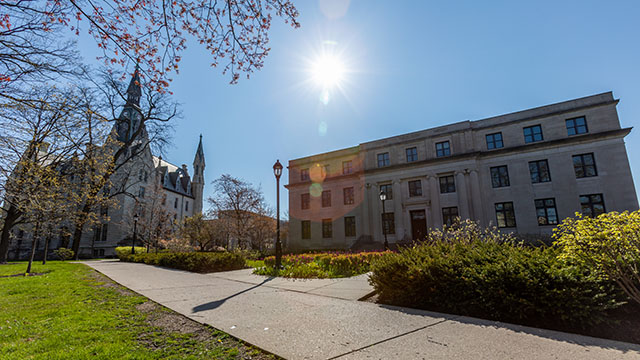President Morton Schapiro addressed the difficult financial constraints Northwestern University is facing due to COVID-19 in his 21st Conversations with the President event today (May 19), held remotely on Zoom. But he also declared he is confident that Northwestern is strong and will start ramping up its research and on-campus activities in the months ahead, as long as it can be done safely.
The president discussed the hard decisions to trim expenses, in a concerted effort to defray a roughly $90 million shortfall in the University’s operating budget brought on by the global pandemic.
He expressed particular concern for the 249 staff members facing furloughs due to the impact of the virus. “These are people we know,” he said. “We are not some large corporate entity where these are just numbers, and it's a headcount. These are people. It's very painful, and we want to bring them back as soon as we can.”
President Schapiro also spoke of measures taken to spread the burden so it was shared more equitably by many, noting, “We also made the decision to temporarily suspend contributions to retirement plans for faculty and staff.”
Still, the president emphasized how strong Northwestern is in its research enterprise, the overwhelming desire of students to attend, the resilience of its community, the growing distinction of its faculty and a steady expanding recognition of its rising global reputation during his tenure as president. He shared his excitement to welcome students, faculty and staff back to campus in due course, but he emphasized that health would remain the top priority in the University’s phased return-to-campus plan.
“We’re only going to do it if we can do it safely,” he said. “It’s not the budget that’s going to make that decision; it’s going to be the safety of our community.”
After President Schapiro’s remarks, he was joined on the Zoom event by Interim Provost Kathleen Hagerty and Senior Vice President for Business and Finance Craig Johnson for a Q&A session.
“Coming back to campus isn’t going to be like flipping a switch, where it’s zero and then 20,000 students on campus the next day,” Hagerty said. “We have been making plans to gradually open the campus. We’ll do it in a controlled way where we can be careful and learn. Once we learn a little more and feel safe, we can go a bit further.”
President Schapiro added that the University also must consider state and local policy in its reopening plan, noting that Illinois continues to be under a stay-at-home order. Additional information about the University’s return-to-campus plan will be announced this week, the president said.
The event was hosted by the Northwestern University Staff Advisory Council (NUSAC) in partnership with the Office of the President.
NUSAC Chair Nate Daigle said his group hoped “to highlight issues and questions of great importance to the University community" during a challenging time for Northwestern. Questions were gathered by NUSAC ahead of the event.
President Schapiro, Hagerty and Johnson answered a range of questions about Northwestern’s financial health, students and the impact of the coronavirus on the University. The leaders spoke of Northwestern’s continued strengths, some of them actually enhanced as a result of the virus.
President Schapiro cited recent headlines describing many colleges and universities’ concern about whether they will have enough students to enroll in the fall.
“We have a program and reputation unparalleled at our great University because of all of you: faculty, staff, students, parents, alumni. You've made an extraordinary difference,” he said. “In U.S. News (rankings), we went from 13 to 12 to 11 to 10 to 9. That's made a real difference in the perception of where Northwestern stands within the global hierarchy of admissions in terms of reputation,” the president said.
“What I'm really proud of as president of Northwestern, it's not just increased strength and momentum in one area,” he said. “We're broadly fabulous in everything, and I'm talking about the arts and humanities, quantitative social science and the humanistic social sciences, and, of course, in our myriad STEM programs as well.”
Community and the University mission
Johnson spoke of how the University has risen to the occasion of this challenge in the era of COVID-19. He has observed an “amazing amount of camaraderie, pulling together, all-nighters, trying to get through this.
“Before this happened, one of my main goals was allowing people to progress in their careers, to have talent management plans, to have career succession. And seeing this, we want to support them and help their careers grow — because this is a life-defining and career-defining event — and to help them step up,” he added.
“We're better together when we're talking and sharing ideas,” Johnson said. “And it's so important to our society that we have got to get it back. People pulling together inspires me, and I think it's a great opportunity to be part of something really wonderful.”
